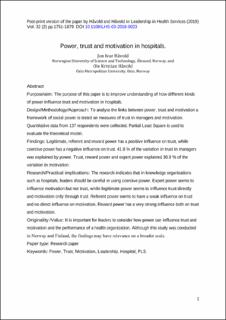Power, trust and motivation in hospitals
Peer reviewed, Journal article
Accepted version

Åpne
Permanent lenke
https://hdl.handle.net/11250/2650181Utgivelsesdato
2019Metadata
Vis full innførselSamlinger
Sammendrag
Purpose The purpose of this paper is to improve understanding of how different kinds of power influence trust and motivation in hospitals. Design/methodology/approach To analyze the links between power, trust and motivation, a framework of social power is tested on measures of trust in managers and motivation. Quantitative data from 137 respondents were collected. Partial least square is used to evaluate the theoretical model. Findings Legitimate, referent and reward power has a positive influence on trust, while coercive power has a negative influence on trust. In total, 41.8 per cent of the variation in trust in managers was explained by power. Trust, reward power and expert power explained 30.9 per cent of the variation in motivation. Practical implications The research indicates that in knowledge organizations such as hospitals, leaders should be careful in using coercive power. Expert power seems to influence motivation but not trust, while legitimate power seems to influence trust directly and motivation only through trust. Referent power seems to have a weak influence on trust and no direct influence on motivation. Reward power has a very strong influence both on trust and motivation. Originality/value It is important for leaders to consider how power can influence trust, motivation and the performance of a health organization. Although this study was conducted in Norway and Finland, the findings may have relevance on a broader scale.